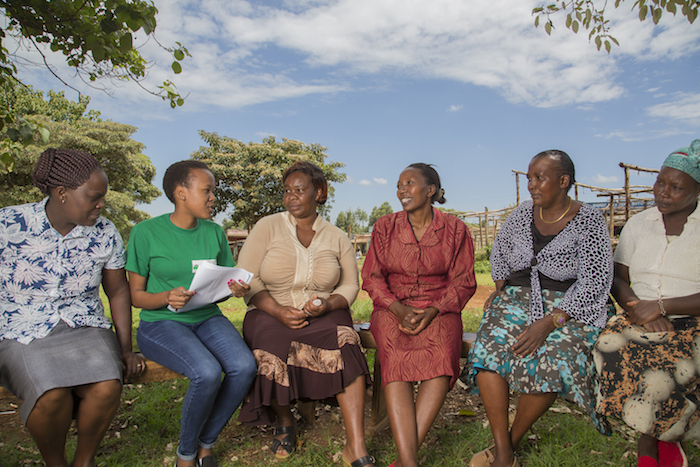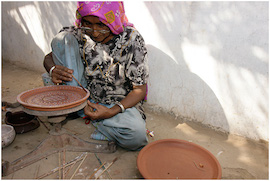WDI’s Performance Measurement and Improvement team, together with Good Business Lab, will conduct an ex-post evaluation of TechnoServe business accelerator programs that have operated in Chile, Peru, Guatemala, El Salvador, Honduras, Nicaragua and Panama since 2008. Using WhatsApp and phone interviews to collect data from program participants, we seek to estimate the sustainability of the programs’ impact on the entrepreneurs and their businesses.

A Juhudi Kilimo representative speaks with smallholder farmers. The organization is the subject of one of the case writing entries for WDI’s case writing competition. (Image credit: Juhudi Kilimo)
WDI Publishing received 50 entries from 11 countries for its case writing competition, which is being held to commemorate WDI’s 25th anniversary and its years of work developing private sector solutions in low- and middle-income countries. Completed case studies, and accompanying teaching notes, must be submitted by Dec. 8 and the winners will be announced March 15, 2018.
Of the 50 entries, 41 are faculty and nine are student authors. Three authors entered more than one case, and 12 entries came from faculty members in the Philippines who were trained in case writing by WDI as part of its work on the STRIDE project.
Eleven universities in India are represented in the competition, nine from the Philippines and eight from the United States, including four from the University of Michigan’s Ross School of Business. Other countries represented in the competition are Australia, Canada, Kenya, Russia, Singapore, Switzerland, Ukraine and the United Kingdom.
Case study topics must describe a dilemma or challenge faced by a company or organization related to creating, implementing, evaluating, and/or disseminating market-based solutions in developing countries.
The proposed case studies are set in 17 different countries, including Angola, China, Estonia, Greece, Honduras, Kyrgyzstan, Mexico and the United Arab Emirates.
Some of the organizations and companies featured in the proposed cases include Just Us! Coffee Roasters Co-op, Solar Ear, Tallinna Kaubamaja, Digital Empowerment Foundation, SafeMotos, Juhudi Kilimo and SMART Diaphragm.
“I’m very excited and pleased by the global interest in our competition as evidenced by the demographics of our entrants,” said Sandy Draheim, manager of WDI Publishing. “And the relevance of the proposed case study topics and featured organizations align very well with WDI’s mission and focus. We are truly looking forward to the opportunity to publish and disseminate teaching cases about market-based solutions in developing countries.”
The competition, organized and administered by WDI Publishing was open to individual students or student teams, as long as they entered in collaboration with a faculty member from a degree-granting university or college. Faculty or faculty teams also could enter as long as they were currently teaching at a degree granting university or college.
The first place team or individual will win $3,500. The second place team or individual will win $2,500, and $1,000 will be awarded for third place. Additionally, each winning case will be professionally published by WDI Publishing.
Judges for the competition are: Kim Bettcher, senior knowledge manager at the Center for International Private Enterprise; John Branch, clinical assistant professor of business administration at the University of Michigan’s Ross School of Business; Gautam Kaul, professor of finance and the Fred M. Taylor Professor of Business Administration at Michigan Ross; and, Jordan Siegel, associate professor of corporate strategy at Michigan Ross.
WDI Publishing has organized and administered past case writing competitions. From 2011-2015, NextBillion, an affiliate of WDI, and NextBillion partner Citi Foundation sponsored competitions for the best-written case studies about business strategies aimed at alleviating poverty – especially at the economic base of the pyramid.
Hospital Evangelico, in the city of Siguatepeque, Honduras, was established in 1949 by the Central American Mission from Dallas, USA. The hospital offers affordable services and programs to reach people in need. The mission of Hospital Evangelico is “to promote total health: physical, emotional, social and spiritual.” It offers a full range of clinical and diagnostic services, in addition to providing nursing education and community outreach programs. An intern was engaged to conduct an analysis of the hospital’s current financial situation and deliver recommendations and a roadmap to aid the hospital in meeting its goal. The student intern assessed and provided recommendations within the following areas: organizational structure, workforce (wages, benefits, turnover, skilled vs. unskilled, employee satisfaction), infrastructure/operations, internal processes, patient trend, revenue, costs, donations, financial reporting/metrics, and organizational culture.
WDI’s Scaling Impact Initiative is working with Walmart to chronicle what the retail giant has learned from its efforts to include small producers in global supply chains.

The successes, challenges, and lessons learned will become a policy brief and a teaching case, both written by WDI in collaboration with Professor Linda Scott of Oxford University’s Said Business School. Both documents will be published this spring, and are geared toward Walmart and other retailers looking to develop more effective sourcing programs in the future.
WDI Vice President of Scaling Impact Ted London and Research Manager Colm Fay, along with Scott, are studying two Walmart programs.
One is Empowering Women Together, which sources handicrafts from women-owned base of the pyramid businesses in East Africa, Nepal, India and other emerging markets to sell online. The other is Direct Farm, which buys fresh fruits and vegetables from small- and medium-sized farmers to supply Walmart’s stores in Central and South America, Mexico, South Africa, and India.
The team has interviewed managers from Walmart, the Walmart Foundation, and their implementing partners.
This is the second collaboration between WDI and Walmart. Last year, WDI Publishing released a case study on the evolution of a global cross-sector partnership between Walmart and the United States Agency for International Development (USAID). The case looked at what had been gleaned – both positive and negative – during the 15-year collaboration between the two organizations.
The free case, “Walmart and USAID: The Evolution of a Global Cross-Sector Partnership,” focused on partnerships that sought to engage smallholder farmers in the developing world, and highlighted examples from Honduras, Guatemala, Rwanda and Bangladesh. It explored the ways in which these collaborations came about, how they were supported by the partners, and the level of success achieved as measured by Walmart, the Walmart Foundation, and USAID.
The case also identified lessons learned for the future of the Walmart/USAID collaboration, and insights that may apply to the development of public-private partnerships for development more broadly.
In addition, NextBillion’s Kyle Poplin wrote a post on how the case was developed. And Beth Keck, senior director of Women’s Economic Empowerment at Walmart, sat down for a video interview with WDI’s London about the company’s global work.
Image courtesy of Navel Zaveri/Flickr.